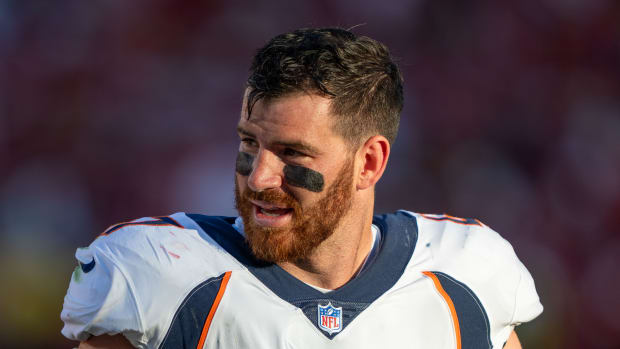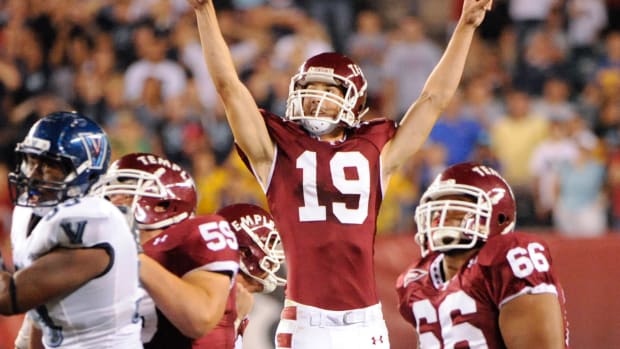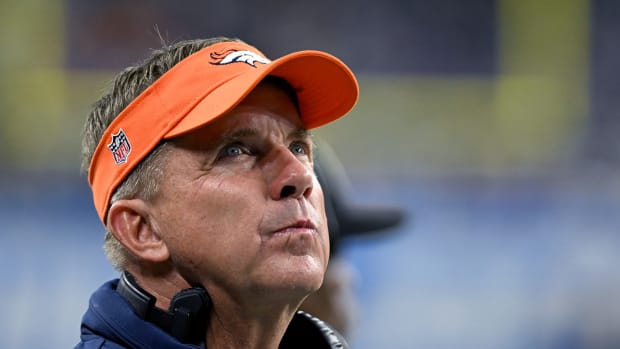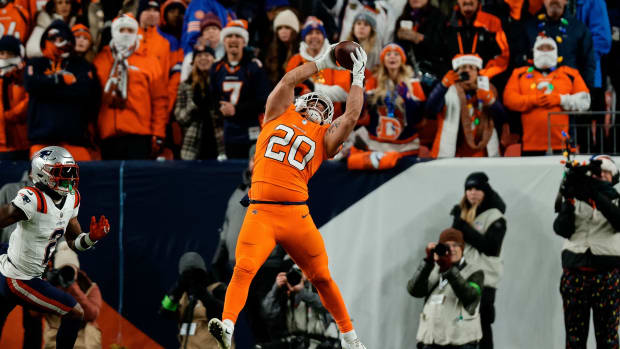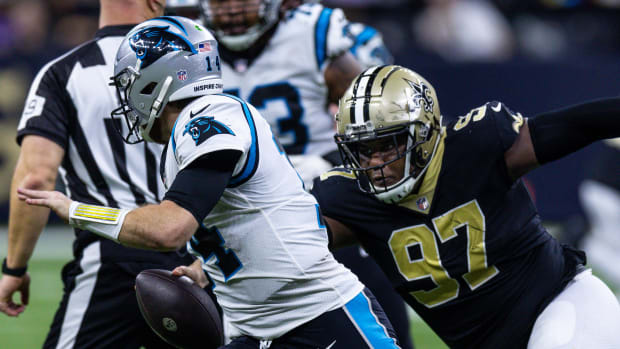Dak Prescott's Contract Dispute Could be Harbinger of Broncos' Future with Drew Lock
The Denver Broncos are fortunate to have Drew Lock under a cost-controlled contract for the next three seasons, thanks to the rookie pay scale in place.
It's particularly good news when you hear about other teams who now have to pay big money to their quarterbacks, such as the Dallas Cowboys with Dak Prescott.
However, if Lock proves to be the quarterback the Broncos can build around, it won't be long before they could face a similar situation that the Cowboys have with Prescott.
To understand how the situation could really unfold, though, it helps to examine Prescott's situation and what he and his agent may be considering when it comes to their contract negotiations — and how that could play into Lock's situation when he is eligible for an extension.
What Really Matters in a QB Contract
First, it's no secret that quarterback contracts are the biggest financial commitment among veterans. We can see how that has worked with QBs who are still in the prime of their careers, such as Russell Wilson averaging $35 million per year on his recent four-year extension and Kirk Cousins averaging $33M per year on his recent two-year extension.
But the average salary per year isn't the primary indicator of how good a contract is for a player. The total guarantees — particularly full guarantees — and new money both matter.
In the latter case, if a player signs an extension when he still has a year left on his current deal, the player and his agent will want to get more money on top of what the player is already set to make in the final year.
For example, Cousins was set to make $30M in 2020 from his previous contract and $21.5M of that money was converted into a portion of the $30M signing bonus. Thus, in terms of new money, Cousins got $66M (which is where the $33M APY figure comes from). His $61M in full guarantees includes the $30M signing bonus, meaning in terms of new fully guaranteed money, he's receiving $39.5M.
Then there's the cash flow, which is about how much cash Cousins receives each year. Though signing bonuses are pro-rated for cap purposes, they are paid out for cash purposes in the year the contract is signed — meaning Cousins gets his $30M signing bonus this year, along with a $9.5M base salary.
In 2021, Cousins gets a $21M base salary, meaning the cash flow in 2020 and 2021 totals $60.5M. The final year of the deals calls for a base salary of $35M. So if you hear someone says that Cousins gets $35M in the final year of his extension, that sounds like a lot — but it pales in comparison to the $60.5M he'll receive in 2020 and 2021.
For more explanation about the importance of cash flow, you may read what Over The Cap's Jason Fitzgerald had to say about Prescott's contract negotiations and how cash flow compares for different QBs. Of particular note is the contract for Wilson, who got more favorable cash flow in his contract, because he collects the bulk of his deal earlier in his contract than other QBs do.
This is important regarding Prescott because when you hear reports that Prescott was turning down a deal that had $45M in the final year of the offer, that doesn't mean he and his agent made a bad decision. If Prescott won't collect the bulk of the money in his contract until the final year or two, that's not as good a deal for him, as one in which he collects a larger sum of money in the first two years.
It's true that many quarterbacks will collect the full amount of their contracts because a good QB is assured of keeping his roster spot for a long time. However, we have seen that isn't always the case, given that the likes of Joe Flacco, Andy Dalton, and Cam Newton were all released before their contracts expired. All of them, earlier in their careers, were at least considered a QB a team could build around.
It's also true Cousins got his three-year deal he signed with the Vikings back in 2018 fully guaranteed. But that was a three-year deal — if a QB is taking a five-year deal, it's going to be much harder to get that final year of the deal fully guaranteed. Flacco, Dalton, and Newton are all examples of QBs who declined as they aged, hence why it can be risky to fully guarantee too much money to a QB over the long term.
Why Contract Length Matters
But that brings us to another point regarding Prescott, and that's the contract length he and his agent are seeking. There have been reports of Prescott denying reports that he turned down a five-year, $175M deal and that Prescott wants $45M in the final year of the deal.
SI's Cowboy's insider Mike Fisher reports that the Cowboys have a standing offer of $175M over five years, which equals $35M APY. Per Fisher, Dak wants less term on his deal, and is seeking a four-year contract.
The issue at hand is really about contract length. As Fisher reports, Prescott wants a four-year deal while the Cowboys are seeking a five-year accord.
For the Cowboys, a longer contract is good for two reasons. First, it allows them to better spread out a signing bonus because it can be pro-rated over five years (the maximum duration it may be pro-rated) rather than four. That helps keep cap numbers smaller and reduces potential dead money charges if a player.
Second, it ensures the Cowboys can keep Prescott for a longer-term when QB salaries continue to rise. For Prescott, a smaller signing bonus means less cash upfront — and thus the potential for better cash flow could be reduced — and, if he continues to play well, he has the opportunity to cash in on those rising quarterback salaries.
Some might point out that Prescott takes some risk with a shorter-term deal, because if his play declines, he'll miss out on a bigger salary. However, if he takes the longer deal and his play declines, the Cowboys could cut him anyway, meaning he doesn't collect on the final years of the deal.
Prescott and his agent will point to extensions that Wilson, Carson Wentz, and Jared Goff signed for four years and argue that's the length Prescott should get, too. The Cowboys, however, have made it their practice to go with deals of five or six years for players they want to keep for the long term.
Add to this the fact that Prescott wasn't a first-round pick, meaning the Cowboys didn't get the fifth-year option when they drafted him. A team can always exercise the option for a first-round QB and hold off on extension talks if they wish.
Not so with QBs taken in later rounds — when their four-year deals expire, the days of having that QB on a cheap salary are over, if they prove to be the guy you can build around.
What This Could Mean for Lock
So what does this all have to do with Lock? First of all, there's the obvious comparison to Prescott: Lock has no fifth-year option on his rookie contract. So when 2023 arrives, Lock is eligible for unrestricted free agency and, while the Broncos can always use the franchise tag, it won't be cheap.
The second point is also obvious: quarterback salaries continue to rise, so if Lock proves to be the guy in Denver, he could be in line for a bigger payday than perhaps what Wilson is currently getting.
Even if Prescott takes less money than Wilson, there are other QBs who will be set for extensions and at least one is likely to re-set the market. If Lock proves to be the guy, he will most likely exceed whatever Prescott gets in a deal.
The third is a less obvious point, but an important one: if Prescott gets his way and only has to sign a four-year deal, that opens the door for other QBs. Why would, say, Patrick Mahomes and DeShaun Watson take any contract for more than four years if that's what Prescott gets?
And what does that mean for the likes of Lamar Jackson, Baker Mayfield, or Josh Allen if they prove worthy of extensions?
All of a sudden, the most important position in the NFL becomes one in which players won't be willing to take a deal for five years or longer. The result: prices keep going up because QB contracts expire more frequently.
There's also the cash flow to consider. The Broncos typically go with smaller signing bonuses, because they reduce dead money charges if they cut a player before his contract expires.
But smaller signing bonuses, with large portions of a contract pushed into the final years of base salaries, don't give the player as good of cash flow as do deals with larger signing bonuses, which represent more cash in the first year.
This is important because Lock is represented by Creative Artists Agency, with Tom Conden heading the football division. Conden is one of the toughest negotiators among NFL agents and has strong knowledge about how NFL contracts work.
It's true that Condon wasn't able to get a lot of concessions in the rookie contract Lock signed, but that was when Lock needed to learn the playbook and get into training camp. If Lock leads the Broncos to the playoffs the next three seasons — and particularly if he gets them to a Super Bowl — things will be different than when Lock was a rookie.
And if other QBs who prove to be long-term guys are taking four-year deals, it's not hard to see Conden asking for the same contract length, plus seeking the best possible cash flow to the contract. That could be an issue for the Broncos, who prefer to go with smaller signing bonuses and have, for most franchised players, signed them to deals for five years or more (Matt Prater is the exception, but as a kicker, he doesn't play a premium position).
The Takeaway
Of course, the Broncos don't have to worry about an extension for Lock for a couple of seasons. Furthermore, I've previously discussed that a big contract for a quarterback doesn't make it impossible to build a team around him, but it means that you need to do a good job of drafting and developing players, while being smart about free agency and trades.
But the Prescott negotiations are something to keep in mind, as will be any contract negotiation for a quarterback. They could all have an impact on a possible extension for Lock.
And given that quarterback salaries aren't going to come down any time soon, fans should enjoy the low-cost years for Lock while they can. If he proves to be the guy, the low-cost years will eventually come to an end.
Follow Bob on Twitter @BobMorrisSports and @MileHighHuddle.
